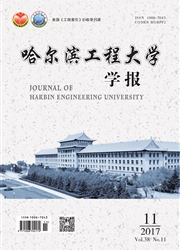

 中文摘要:
中文摘要:
为在生产和广泛使用氯氧镁水泥时提高氯氧镁水泥相稳定性,运用热力学方法对MgO—MgCl2.H2O体系水化产物的生成、溶解和相转化进行分析,并对不同MgO/MgCl2摩尔比的氯氧镁水泥的耐水性和相变规律进行试验研究.结果表明,水泥石所处的溶液pH值对水化产物相稳定有较大影响,pH升高水化产物的溶解度减小,相稳定性提高;当pH值大于10.37时,溶液析出大量Mg(OH)2使水化产物相稳定性变差.当摩尔比小于6时,随着摩尔比的增大,水化产物内部过量MgO增多使体系碱度提高,水化产物稳定性改善;当摩尔比大于6时,水化产物中含过量MgO,由于较多Mg(OH)2生成产生过大的结晶应力,引起水泥石结构破坏.
 英文摘要:
英文摘要:
Enhancing the stability of magnesium oxychloride cement (MOC) will allow greater production and appli- cation of magnesium oxychloride cement. The formation, solution and phase change of hydration products in an MgO-MgCl2-H2O system were analyzed by the thermodynamics method. Experiments were done testing resistance of the concrete to immersion in water and examining the phase change rules for the curing of magnesium oxychloride cement at various MgO/MgCl2 molar ratios. The results showed that pH values of solutions in which MOC concrete is immersed clearly influenced phase stability of hydration products. A higher pH value led to lower solubility and better phase stability of hydration products. When the solutiong pH value was higher than 10.37, the precipitation of a significant volume of Mg(OH) 2 crystals decreased phase stability of hydration products. With increased MgO/ MgCl2 molar ratio (lower than 6) , increased MgO in the hydration products enhanced the alkalinity of the solution and phase stability was improved. However, when the MgO/MgCl2 molar ratio was higher than 6 excessive MgO existed in the hydration products. Such concrete may be damaged by the excessive crystallization stress of a great deal of Mg(OH) 2 formation.
 同期刊论文项目
同期刊论文项目
 同项目期刊论文
同项目期刊论文
 Compressive strength and permeability of high-performance concrete under different curing conditions
Compressive strength and permeability of high-performance concrete under different curing conditions 期刊信息
期刊信息
